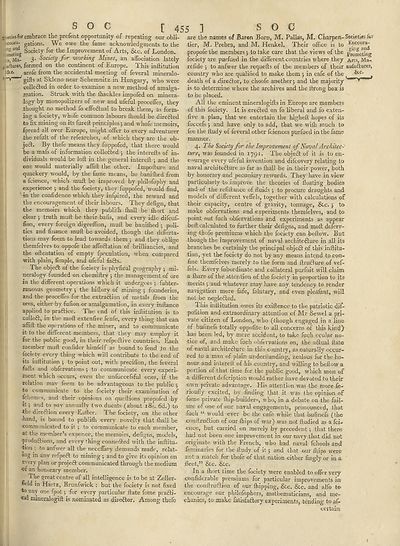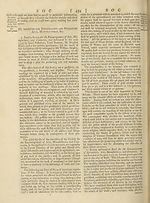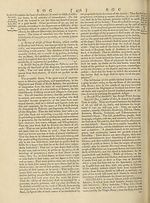Encyclopaedia Britannica, or, a Dictionary of arts, sciences, and miscellaneous literature : enlarged and improved. Illustrated with nearly six hundred engravings > Volume 19, Scripture-SUG
(501) Page 455
Download files
Complete book:
Individual page:
Thumbnail gallery: Grid view | List view

s o c
; etiesfor embrace the prefent opportunity of repeating our obli-
coura- gations. We owe the fame acknowledgments to the
tine Socjety ^or t^ie Improvement of Arts, &c. of London.
™°Ma- 3- Society for working Mines, an affociation lately
,taftures, formed on the continent of Europe. This inftitution
iStc. arofe from the accidental meeting of feveral mineralo-
J at gyeno near Schemnitz in Hungary, who were
collefted in order to examine a new method of amalga¬
mation. Struck with the fhackles impofed on minera¬
logy by monopolizers of new and ufeful proceffes, they
thought no method fo effectual to break them, as form¬
ing a fociety, whofe common labours fhould be dire&ed
to fix mining on its fureft principles; and whofe memoirs,
fpread all over Europe, might offer to every adventurer
the refult of the refearches, of which they are the ob¬
ject. By thefe means they fuppofed, that there would
be a mafs of information collect'd ; the interefts of in¬
dividuals would be loft in the general intereft ; and the
one 'would materially affift the. other. Impofture and
quackery would, by the fame means, be banilhed from
a fcience, which mull be improved by philofophy and
experience ; and the fociety, they fuppofed, would” find,
in the confidence which they infpired, the reward and
the encouragement of their labours. They defign, that
the memoirs which they publifti lhall be ftiort and
clear ; truth mult be their balls, and every idle difeuf-
fion, every foreign digreffion, mull be banilhed ; poli¬
tics and finance mull be avoided, though the differta-
tions may feem to lead towards them ; and they oblip-e
themfelves to oppofe the affe&ation of brilliancies, and
the oftentation of empty fpeculation, Avhen compared
with plain, Ample, and ufeful fafls.
The object of the foeiety is phyfical geography ; mi¬
neralogy founded on chemiftry ; the management of ore
in the different operations which it undergoes ; fubter-
raneous geometry ; the hiftory of mining ; founderies,
and the proceffes for the extradtion of metals from the
ores, either by fufion or amalgamation, in every inftance
applied to pradlice. The end of this inftitution is to
colledt, in the moll extenfive fenfe, every thing that can
affift the operations of the miner, and to communicate
it to the different members, that they may employ it
for the public good, in their refpedtive countries. Each
member muft conlider himfelf as bound to fend to the
fociety every thing which will contribute to the end of
its inftitution ; to point out, with precifion, the feveral
fadls and obfervations ; to communicate every experi¬
ment which occurs, even the unfuccefsful ones, if the
relation mav feem to be advantageous to the public ;
to communicate to the fociety their examination of
fchernes, and their opinions on queftions propofed by
it; and to pay annually two ducats (about 18s. 6d.) to
the diredlion every Eafter. The fociety, on the other
•hand, is bound to publifti every novelty that ftiall be
communicated to it ; to communicate to each member,
at the member’s expence, the memoirs, defigns, models,
productions, an<I every ’king eonnedted with the inftitu¬
tion •, to anfwer all the neceffary demands made, relat¬
ing in anv refpedl to mining ; and to give its opinion on
every plan or projedl communicated through the medium
of an honorary member.
The great centre of all intelligence is to be at Zeller-
field in Hartz, Brunfwick : but the fociety is not fixed
to any one fpot; for every particular ftate fome pradti-
■cal mineralogift is nominated as diredlor. Among thefe
[ 455 1
s o c
are the names of Baron Born, M. Pallas, M. Charpen- Societies tor
tier, M. Prebra, and M. Henkel. Their office is to EPC01^"
propofe the members; to take care that the views of the pgr^ot;ng
fociety are purfued in the different countries where they Arts, Ma-
refide ; to anfwer the requefts of the members of their aufadtures,
country who are qualified to make them ; in cafe of the ^cc* .
death of a diredtor, to choofe another; and the majority
is to determine where the archives and the ftrong box is
to be placed.
All the eminent mineralogifts in Europe are members
of this fociety. It is eredted on fo liberal and fo exten¬
five a plan, that we entertain the higheft hopes of its
fuccefs ; and have only to add, that we wifti much to
fee the ftudy of feveral other fciences purfued in the fame
manner.
4. The Society for the Improvement of Naval Architec¬
ture, was founded in 1791. The objedt of it is to en~
wmrage every ufeful invention and difeovery relating to
naval architecture as far as ftiall be in their power, both
by honorary and pecuniary rewards. They have in view
particularly to improve the theories of floating bodies
and of the refiftance of fluids ; to procure draughts and
models of different veffels, together with calculations of
their capacity, centre of gravity, tonnage, &c. ; to
make obfervations and experiments themfelves, and to
point out fuch oblervations and experiments as appear
beft calculated to further their defigns, and moll deferv-
ing tfiofe premiums which the fociety can beftow. But
though the improvement of naval architecture in all its
branches be certainly the principal objedt of this inftitu¬
tion, yet the fociety do not by any means intend to con¬
fine themfelves merely to the form and itructure of vef¬
fels. Every lubordinate and collateral purfuit will claim
a lhare of the attention of the fociety in proportion to its
merits; and whatever may have any tendency to render
navigation more fafe, falutary, and even plealant, will
not be negledted.
I his inftitution owes its exiftence to the patriotic dif-
pufilion and extraordinary attention of Mr Sewel a pri¬
vate citizen of London, who (though engaged in a line
of bufinefs totally oppofite to all concerns of this kind)
has been led, by mere accident, to take fuch ocular no¬
tice of, and make luch obfervations on, the adtual ftate
of naval architedlure in this country, as naturally occur¬
red to a man of plain underitanding, zealous for the ho¬
nour and intereft of his country, and willing to beftow a
portion of that time for the public good, which men of
a different defeription would rather have devoted to their
own private advantage. His attention was the more le-
rioufly excited, by finding that it was the opinion of
fome private {hip-builders, who, in a debate on the fail¬
ure of one of our naval engagements, pronounced, that
fuch “ would ever be the cafe while that bufinefs (the
conftru&ion of our (hips of war) was not ftudied as a fci¬
ence, but carried on merely by precedent ; that there
had not been one improvement in our navy that did not
originate with the French, who had naval fchools and
feminaries for the ftudy of it; and that our flaps were
not a match for thofe of that nation either finely or in a
fleet,” &c. &c.
In a fliort lime the fociety were enabled to offer very
ctenfiderable premiums for particular improvements in
the conftruftion of our {hipping, &c. &c. and alfo to
encourage our philctfophers, mathematicians, and me¬
chanics, to make fatisfadlory experiments, tending to afi-
eertaiu
; etiesfor embrace the prefent opportunity of repeating our obli-
coura- gations. We owe the fame acknowledgments to the
tine Socjety ^or t^ie Improvement of Arts, &c. of London.
™°Ma- 3- Society for working Mines, an affociation lately
,taftures, formed on the continent of Europe. This inftitution
iStc. arofe from the accidental meeting of feveral mineralo-
J at gyeno near Schemnitz in Hungary, who were
collefted in order to examine a new method of amalga¬
mation. Struck with the fhackles impofed on minera¬
logy by monopolizers of new and ufeful proceffes, they
thought no method fo effectual to break them, as form¬
ing a fociety, whofe common labours fhould be dire&ed
to fix mining on its fureft principles; and whofe memoirs,
fpread all over Europe, might offer to every adventurer
the refult of the refearches, of which they are the ob¬
ject. By thefe means they fuppofed, that there would
be a mafs of information collect'd ; the interefts of in¬
dividuals would be loft in the general intereft ; and the
one 'would materially affift the. other. Impofture and
quackery would, by the fame means, be banilhed from
a fcience, which mull be improved by philofophy and
experience ; and the fociety, they fuppofed, would” find,
in the confidence which they infpired, the reward and
the encouragement of their labours. They defign, that
the memoirs which they publifti lhall be ftiort and
clear ; truth mult be their balls, and every idle difeuf-
fion, every foreign digreffion, mull be banilhed ; poli¬
tics and finance mull be avoided, though the differta-
tions may feem to lead towards them ; and they oblip-e
themfelves to oppofe the affe&ation of brilliancies, and
the oftentation of empty fpeculation, Avhen compared
with plain, Ample, and ufeful fafls.
The object of the foeiety is phyfical geography ; mi¬
neralogy founded on chemiftry ; the management of ore
in the different operations which it undergoes ; fubter-
raneous geometry ; the hiftory of mining ; founderies,
and the proceffes for the extradtion of metals from the
ores, either by fufion or amalgamation, in every inftance
applied to pradlice. The end of this inftitution is to
colledt, in the moll extenfive fenfe, every thing that can
affift the operations of the miner, and to communicate
it to the different members, that they may employ it
for the public good, in their refpedtive countries. Each
member muft conlider himfelf as bound to fend to the
fociety every thing which will contribute to the end of
its inftitution ; to point out, with precifion, the feveral
fadls and obfervations ; to communicate every experi¬
ment which occurs, even the unfuccefsful ones, if the
relation mav feem to be advantageous to the public ;
to communicate to the fociety their examination of
fchernes, and their opinions on queftions propofed by
it; and to pay annually two ducats (about 18s. 6d.) to
the diredlion every Eafter. The fociety, on the other
•hand, is bound to publifti every novelty that ftiall be
communicated to it ; to communicate to each member,
at the member’s expence, the memoirs, defigns, models,
productions, an<I every ’king eonnedted with the inftitu¬
tion •, to anfwer all the neceffary demands made, relat¬
ing in anv refpedl to mining ; and to give its opinion on
every plan or projedl communicated through the medium
of an honorary member.
The great centre of all intelligence is to be at Zeller-
field in Hartz, Brunfwick : but the fociety is not fixed
to any one fpot; for every particular ftate fome pradti-
■cal mineralogift is nominated as diredlor. Among thefe
[ 455 1
s o c
are the names of Baron Born, M. Pallas, M. Charpen- Societies tor
tier, M. Prebra, and M. Henkel. Their office is to EPC01^"
propofe the members; to take care that the views of the pgr^ot;ng
fociety are purfued in the different countries where they Arts, Ma-
refide ; to anfwer the requefts of the members of their aufadtures,
country who are qualified to make them ; in cafe of the ^cc* .
death of a diredtor, to choofe another; and the majority
is to determine where the archives and the ftrong box is
to be placed.
All the eminent mineralogifts in Europe are members
of this fociety. It is eredted on fo liberal and fo exten¬
five a plan, that we entertain the higheft hopes of its
fuccefs ; and have only to add, that we wifti much to
fee the ftudy of feveral other fciences purfued in the fame
manner.
4. The Society for the Improvement of Naval Architec¬
ture, was founded in 1791. The objedt of it is to en~
wmrage every ufeful invention and difeovery relating to
naval architecture as far as ftiall be in their power, both
by honorary and pecuniary rewards. They have in view
particularly to improve the theories of floating bodies
and of the refiftance of fluids ; to procure draughts and
models of different veffels, together with calculations of
their capacity, centre of gravity, tonnage, &c. ; to
make obfervations and experiments themfelves, and to
point out fuch oblervations and experiments as appear
beft calculated to further their defigns, and moll deferv-
ing tfiofe premiums which the fociety can beftow. But
though the improvement of naval architecture in all its
branches be certainly the principal objedt of this inftitu¬
tion, yet the fociety do not by any means intend to con¬
fine themfelves merely to the form and itructure of vef¬
fels. Every lubordinate and collateral purfuit will claim
a lhare of the attention of the fociety in proportion to its
merits; and whatever may have any tendency to render
navigation more fafe, falutary, and even plealant, will
not be negledted.
I his inftitution owes its exiftence to the patriotic dif-
pufilion and extraordinary attention of Mr Sewel a pri¬
vate citizen of London, who (though engaged in a line
of bufinefs totally oppofite to all concerns of this kind)
has been led, by mere accident, to take fuch ocular no¬
tice of, and make luch obfervations on, the adtual ftate
of naval architedlure in this country, as naturally occur¬
red to a man of plain underitanding, zealous for the ho¬
nour and intereft of his country, and willing to beftow a
portion of that time for the public good, which men of
a different defeription would rather have devoted to their
own private advantage. His attention was the more le-
rioufly excited, by finding that it was the opinion of
fome private {hip-builders, who, in a debate on the fail¬
ure of one of our naval engagements, pronounced, that
fuch “ would ever be the cafe while that bufinefs (the
conftru&ion of our (hips of war) was not ftudied as a fci¬
ence, but carried on merely by precedent ; that there
had not been one improvement in our navy that did not
originate with the French, who had naval fchools and
feminaries for the ftudy of it; and that our flaps were
not a match for thofe of that nation either finely or in a
fleet,” &c. &c.
In a fliort lime the fociety were enabled to offer very
ctenfiderable premiums for particular improvements in
the conftruftion of our {hipping, &c. &c. and alfo to
encourage our philctfophers, mathematicians, and me¬
chanics, to make fatisfadlory experiments, tending to afi-
eertaiu
Set display mode to:
![]() Universal Viewer |
Universal Viewer | ![]() Mirador |
Large image | Transcription
Mirador |
Large image | Transcription
Images and transcriptions on this page, including medium image downloads, may be used under the Creative Commons Attribution 4.0 International Licence unless otherwise stated. ![]()
| Permanent URL | https://digital.nls.uk/192701795 |
|---|
| Attribution and copyright: |
|
|---|
| Description | Ten editions of 'Encyclopaedia Britannica', issued from 1768-1903, in 231 volumes. Originally issued in 100 weekly parts (3 volumes) between 1768 and 1771 by publishers: Colin Macfarquhar and Andrew Bell (Edinburgh); editor: William Smellie: engraver: Andrew Bell. Expanded editions in the 19th century featured more volumes and contributions from leading experts in their fields. Managed and published in Edinburgh up to the 9th edition (25 volumes, from 1875-1889); the 10th edition (1902-1903) re-issued the 9th edition, with 11 supplementary volumes. |
|---|---|
| Additional NLS resources: |
|

